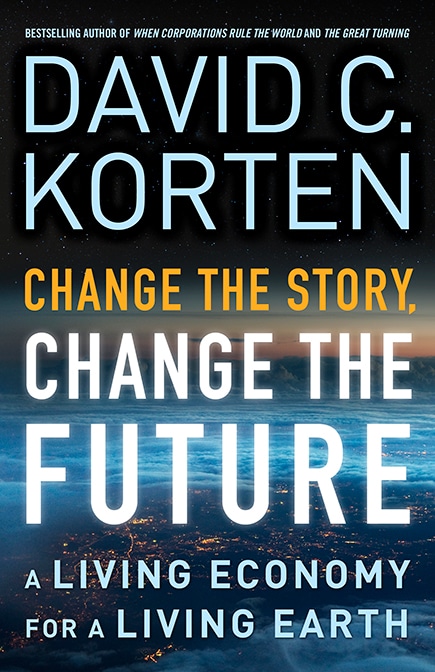Newsletter – October 31, 2023
(For more newslsetters, visit HERE…)
Dear Friends,
The message of this newsletter is directed to the wealthy philanthropists who are committing billions of dollars to creating a better world. While your generosity is impressive, if you really want to make a difference, I urge you to look beyond ameliorating the immediate suffering of people and Earth and invest in transforming the failed system responsible for the current devastation. I hope you will give this piece serious thought and discuss it with your colleagues.
If you, my reader, relate to such an individual, I hope you will share this message with them. If you have no relationship with any wealthy philanthropists, I hope you will enjoy imagining a transformation in the way the wealthy use their fortunes.
My message is simple and challenging. Much of the money flowing into global philanthropy is sourced from profit-maximizing corporations that as a group are driving and enabling the social and environmental crises that serious philanthropy seeks to address. Well-intentioned philanthropists can achieve their goal of a world that works for all only if the ownership of business is transferred from predatory financiers devoted to growing their personal fortunes to working people and the communities in which they live to secure their wellbeing.
— David Korten
____________
How Philanthropists Can Make A
Real Difference

David Korten | October 31, 2023
The world’s richest people are currently directing billions of dollars to charities devoted to treating the devastating social and environmental consequences of a failed economic system. Many have signed the billionaire’s Giving Pledge, which commits them to giving away half of their fortunes before or at the time of their death. We can assume that these philanthropists are truly committed to the creation of a world that works for all.
Because our current economy is structured and managed to grow the fortunes of billionaires, the need for philanthropy is growing at an alarming speed. This is a reality that billionaire philanthropists truly committed to creating a healthy world must ultimately acknowledge and address.
According to Forbes magazine, the 25 most generous U.S. billionaires grew their personal financial assets by some $150 billion during 2022—an average of $6 billion each. Those 25 people are now worth a collective $1.1 trillion. Together they have given away $169 billion during their lifetimes. Seventeen of these 25 have signed The Giving Pledge.
There will be no winners on a dead Earth. Thus, it is in the common interest of all the world’s people, rich and poor alike, to join in creating a future that works for Earth and all its people. While conventional philanthropy attempts to address the consequences of capitalism’s damage, it gives little attention to identifying and correcting the root cause of the devastation. The unnamed cause is a concentration of ownership devoted to the wrong purpose. (I addressed ownership and purpose in my August and July newsletter essays.)
The only valid purpose of any human institution is to serve the wellbeing of people and the living Earth on which our wellbeing depends. When a human institution fails to serve those purposes, we have the right—indeed the obligation—to change or replace it.
Contemporary corporations are very effective in maximizing profits for the world’s richest billionaires. They are failing, however, at fulfilling their proper purpose—meeting the essential needs of people in the communities in which they do business. That purpose is best achieved if the business is cooperatively owned by the working people who live and labor in their community to meet the needs of all their community’s members. The worker-owned Mondragon cooperatives in the Basque region of Spain are a leading example. (See my essay in the March newsletter.)
There was a brief period immediately following WWII when the most respected U.S. corporations were aligned behind what many called stakeholder capitalism—a capitalism dedicated to the wellbeing of all the corporation’s stakeholders: workers, customers, suppliers, owners, and the public. Together, these corporations helped to birth an impressive, although predominantly white, U.S. middle class. This success in turn inspired transformational global movements that then achieved major advances toward equal rights for women and people of color.
In the 1970s and 80s, this commitment of major U.S. corporations gave way to a drive by advocates of predatory capitalism to transform the purpose of the corporation from benefiting all stakeholders to maximizing profits for shareholders and top managers. The success of this assault on the common good spread around the world and accounts in large measure for the current failure of the global economy to meet the needs of billions of people while destroying Earth’s capacity to sustain life.
This monumental setback for humanity did not happen spontaneously. It was driven by psychologically misguided advocates of predatory capitalism who were intent on exploiting Earth and its people for personal gain. The devastating consequences prevail and continue to grow. Excess for the rich. Desperation for the poor. And destruction of Earth’s capacity to sustain life.
Correcting this potentially terminal failure requires shifting the purpose of business from competitive self-enrichment to a cooperative quest for the wellbeing of all. That outcome can be powerfully advanced if it has the support of caring capitalists committed to a democratic capitalism built on a foundation of cooperative worker/community ownership devoted to the wellbeing of all. The key concept is the democratic sharing of power through cooperative ownership.
Tragically, the period of corporate responsibility that followed WWII never addressed the essential issue of democratic ownership. This failure left it vulnerable to takeover by predatory capitalists intent on personal self-enrichment.
Our common human future depends on a deep and rapid transition from rule by institutions that centralize power in the hands of predators, currently exemplified by transnational corporations controlled by and dedicated to enriching billionaires. Success depends on a unified effort that includes corporate leaders prepared to use their wealth, influence, and business acumen to make a more decisive positive difference in the world than typical philanthropy is likely to achieve.
Be aware that some among the predators engage in modest philanthropy to disguise their actual agenda. Their philanthropy is generally more modest and conventional, for example providing meals for a select group of the poor and then proudly advertising their “generosity” on public media. Philanthropists seriously committed to creating a better world will engage in more serious initiatives and rarely advertise their own good works.
What even serious philanthropists commonly miss, however, is that to have real impact they need to help with the transition from institutions that centralize power to institutions that support localization and sharing of power. This failing has beset many revolutions, which commonly feature violence to eliminate existing power holders and then do not decentralize power. Such decentralization requires leadership from those with influence within current institutions of power.
The most obvious candidates for such leadership are philanthropists who are also successful corporate leaders and whose philanthropy demonstrates an authentic concern for the wellbeing of people and the living Earth. A great place to start for such philanthropists is with the corporation that they own or for which they control a major stake. They can support the transition of that company to a worker or community owned enterprise while donating to the rapidly growing number of organizations that specialize in facilitating conversion of conventional businesses to worker/community cooperative ownership, such as the Workers to Owners Collaborative and the Democracy at Work Institute.
These business leaders cannot, however, make these major changes alone. Such change requires action on many fronts, including from labor unions, employee retirement funds, and many other allies. We have an especially urgent need for successful models for the conversion from within of monopolistic, profit-maximizing transnational corporations to cooperative worker/community owned cooperatives devoted to securing the wellbeing of the communities in which they do business.
This is a fitting challenge for dedicated philanthropists. It is not the only way they can address the root causes of our current crises. But it is a powerful step in making the institutional transformation needed to lay the foundation for a world that works for all.
____________
Noteworthy …

“The time has come for business leaders who are truly committed to ESG (Environmental and Social Governance) to take truly serious action. This will include restructuring corporate businesses to limit monopoly power and transfer ownership to their workers and the communities in which they do business.”
From “Growth for Me? Or Wellbeing for All?” – David’s keynote at the opening of the People for Earth 2022 Ecozoic Culture Forum: ESG & Integral Ecology for Earth in Crisis, held in Seoul, South Korea.
Read David’s presentation here…
 “Donella [Meadows] was one of the great breakthrough thinkers of her time,” David wrote in response to a recent BBC Radio “Great Lives” program. “This is a beautiful and timely remembrance. It was my privilege to have been a close friend and colleague. Her real passion was her farm; her computer modeling was a sideline.”
“Donella [Meadows] was one of the great breakthrough thinkers of her time,” David wrote in response to a recent BBC Radio “Great Lives” program. “This is a beautiful and timely remembrance. It was my privilege to have been a close friend and colleague. Her real passion was her farm; her computer modeling was a sideline.”
On this program (28 minutes), Kate Raworth, renegade economist and creator of Doughnut Economics, honors Donella, an environmental scientist and lead author of the 1972 Limits to Growth report, who passed away in 2001 at 59 years. Her life and work still inform and inspire.
Listen to Great Lives…
Read more about Donella here…
____________
From the Book Shelf …

Ownership is power. When that power resides in global financial markets and corporations, it supports making money. When distributed among living people in living communities, it supports making a living.
…
A living economy is composed of and served by living enterprises owned by living people who depend on them for their livelihood. Known to the other members of the community in which they live, these owners have a strong incentive to act with conscience and moral availability. (Pages 114-115)
To engage a conversation on a Living Economy, check out our Discussion Guide and invite a circle of friends to explore the possibilities.
____________
If this newsletter was forwarded to you, please sign up HERE to receive your own copy. For more Newsletter Essays, visit HERE…

